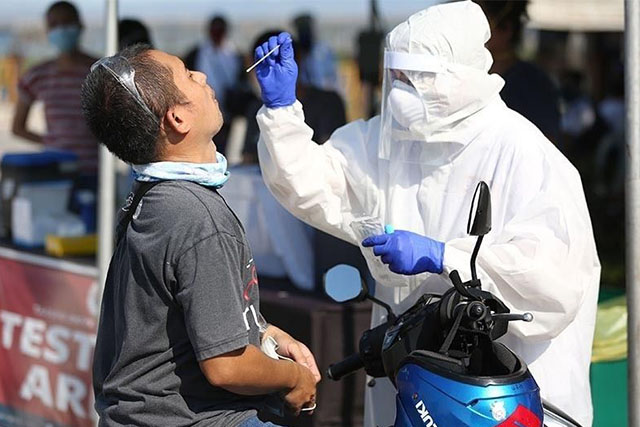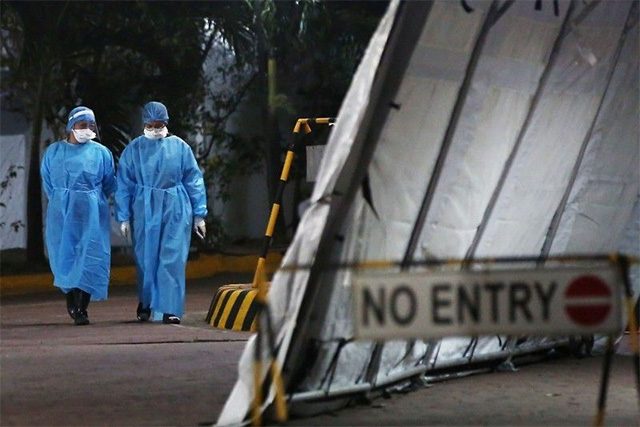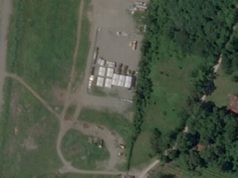The call for mass testing and more health-oriented solutions were once again renewed after Interior Secretary Eduardo Año said that he would deploy more police personnel in Cebu City which was reverted to the strict enhanced community quarantine (ECQ).
In a televised meeting of the members of the Inter-Agency Task Force on COVID-19 and President Rodrigo Duterte aired Monday night, Año said that he planned to deploy more police personnel in the Queen City of South to supposedly enforce ECQ due to the spike of positive cases.
“At ang ating atensyon na binibigyan ngayon ay ang Cebu City, ang Talisay, sapagkat nagkaroon talaga ng spike. At iniisip ko na magdagdag pa ng mga additional na kapulisan dito sa Cebu City para siguradong maipatupad ang ECQ,” he said to the chief executive.
Health Secretary Francisco Duque III said that Cebu City was placed under ECQ from June 16 to 30 due to the increasing number of COVID-19 cases and the widespread community transmission.
An independent tracker reported that the city has the highest number of active cases of individuals currently infected with the viral disease.
As of June 16, Cebu City has 2,223 active cases and a total of 2,683 infections. Its neighboring provinces, Negros Oriental, Siquijor and Bohol, currently do not have any active cases.
Dr. Tony Leachon, a special adviser to the National Task Force on COVID-19, told CNN Philippines that the medical directors and experts from the city have informed the authorities that intensive care units are full, there are no available mechanical ventilators and that the isolation beds are maxed out.
‘Empower health sector’
Meanwhile, Año’s response to Cebu City’s rising cases was not welcomed by some Filipinos who continuously called for medical solutions instead of a beefed-up police force.
“COVID-19 is a health issue. Kahit isang milyong pulis pa ilalagay mo sa Cebu, hindi nito mapipigilan ang pagkalat kung hindi effective ang trace, isolate, and test. Empower the healthcare sector,” a physician commented on Twitter.
A medical student pointed out that the government should instead focus on the following: “Mass testing, increased funding for healthcare and research works and boost information drives on prevention of the disease.”
Another Twitter user likewise said that the following should be done instead of boosting the police force: “Mass testing, expansion of health facilities and intensified contact tracing.”
“Bakit lagi na lang police ‘yung solution nila??? Hello this is a pandemic, MASS TESTING should be the solution. We can’t just all wait for a vaccine, prevention is better than cure nga diba?” wrote another online user.

Filipinos have consistently clamored for mass testing or the widespread testing of all of the suspected cases and aggressive contact tracing of individuals in contact with them since March.
The World Health Organization believes that mass testing is the best way to slow the advance of COVID-19 since this isolates those who are infected, asymptomatic people included.
WHO director general Tedros Adhanom Ghebreyesus earlier said that the cases cannot be isolated and the chain of infection wouldn’t stop if there are no massive testing initiatives.
“You can’t fight a virus if you don’t know where it is. Find, isolate, test and treat every case to break the chains of transmission. Every case we find and treat limits the expansion of the disease,” he said in a press conference last March.
Local proponents of the initiative believe that the following individuals should be tested to be able to properly determine asymptomatic and presymptomatic people:
- All suspected cases
- All of the close contacts of confirmed or probable cases
- Regular testing of all frontline health care workers
- Surveillance for high-risk communities or vulnerable populations
The Department of Health said that it is aiming to test 1.5% of the population by the end of July, as well as increase the number of licensed laboratories that can process the swab tests submitted.
Laboratories are currently able to conduct 10,000 to 11,000 tests per day.
“Mayroon na ho tayong strategies na ini-employ for these things para po magkaroon tayo nang stable na outputs per day and hopefully we can reach this goal of having 1.5 percent of the population tested by the end of July,” DOH Undersecretary Maria Rosario Vergeire said in a virtual presser.










